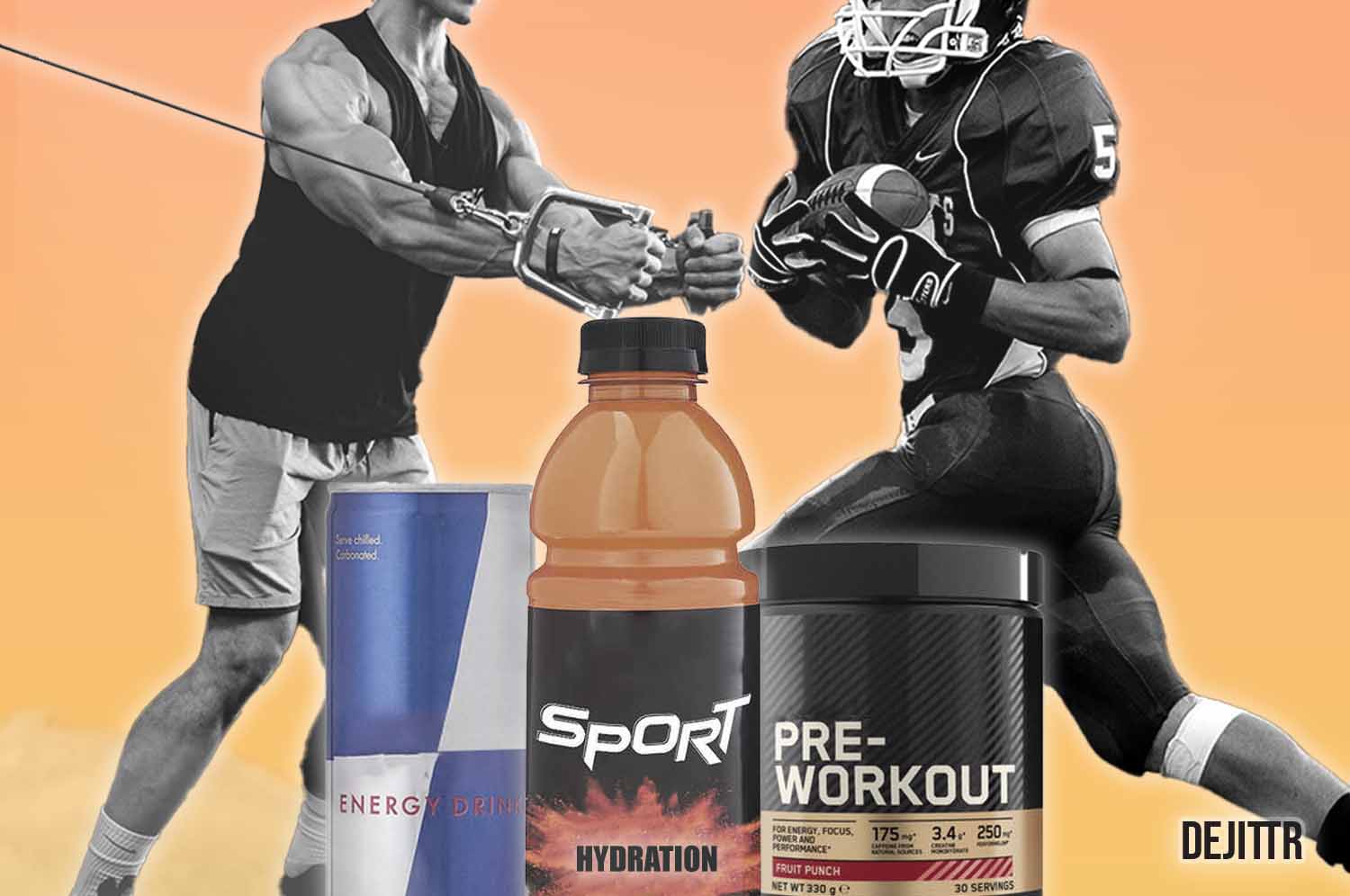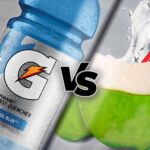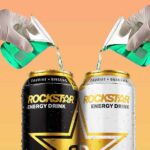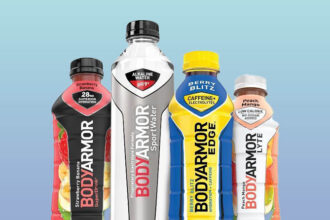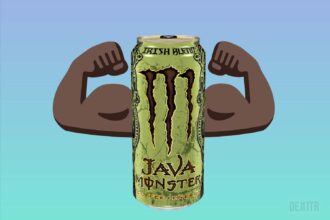During a high-intensity workout or any strenuous physical activity, it’s common to feel like regular water just can’t get you hydrated fast enough. In those cases, you can turn to “boosted” alternatives like hydration drinks, pre-workout supplements, or energy drinks. With so many options to choose from, it’s essential to know which one would work best for you.
Key Takeaways:
Hydration drinks often referred to as sports drinks help boost hydration potential. A pre-workout supplement is a concentrated mixture of essential nutrients that can come in a powder, pill, or drink form. An energy drink is an energy-boosting beverage with caffeine and sweeteners.
The differences and similarities between these products range from their ingredients to how each of them can affect your workout. This article will cover every aspect to help you thoroughly understand each option and its use cases. Let’s get started!
What Are Hydration Drinks?
Hydration drinks are various electrolyte-replacement mixtures. They are often referred to as sports drinks, and they help increase electrolytes in your body. With a higher electrolyte content, the body retains more water.
Most hydration drinks like Gatorade and Prime come in a variety of flavors. The unique taste also encourages you to drink more.
Aside from their hydrating electrolytes, hydration drinks also contain glucose and salts like sodium and potassium. The digestive system quickly breaks down these compounds, so they get transported into the bloodstream much faster from hydration drinks than other sources.
When the glucose and salts raise the overall concentration of the blood and body fluids, a process called osmosis kicks in. Osmosis is a natural process in the semi-porous membranes of body cells that causes them to absorb more water when their concentration increases.
As the contents of hydration drinks raise the concentration of blood and body fluids, the body speeds up its process of absorbing and retaining water. Over time, the drink helps your body absorb more water faster and retain the absorbed water better.
This science is the same concept behind oral rehydration salts; these are used to help people experiencing diarrhea retain more fluid. Because hydration drinks build on the foundation of a decades-old medically approved product, you can be reasonably confident of their safety and effectiveness.
Why Is Hydration So Important?
While hydration drinks seem to go above and beyond to boost the water retention levels of their users, you may wonder why hydration is so vital in the first place.
More than half of the human body is made of water. The water content in our bodies can range from 65% in adults to 75% in children, making it a significant part of your body weight. All the bodily systems function through fluid mechanisms, so this water also plays a crucial role in maintaining their normal functioning.
When partaking in strenuous physical activity, we tend to lose water through the vapor from our rapid breathing or simply through sweat.
As you become more active, your body temperature increases and the body uses more water for its metabolic processes.
The body has natural mechanisms to balance mild water loss, but when it becomes prolonged, dehydration sets in. This form of acute dehydration reduces the amount of blood the heart can pump with each circulation cycle. It also affects oxygen circulation in the body because circulation depends on dissolved gasses.
According to research, dehydration begins to set in as soon as we lose an amount of water that equals 2% or more of our body weight. The effects that you may notice with the onset of dehydration include:
- Increased heart rate
- Rapid breathing
- Muscle cramps
- Headaches
- Dizziness or lightheadedness
If you intend to continue your physical activity despite these effects, you’ll be a lot less effective at it. After a long period without hydration, you might start to experience the symptoms of chronic dehydration. Extreme symptoms are highly unlikely for a short spurt of dehydration, but its effects can be as severe as delirium, hypovolemic shock, or even a breakdown of kidney function.
If you’d like to work at peak performance and keep your systems healthy, it’s crucial to continually rehydrate your body, especially while you’re physically active.
What Are Your Hydration Needs During a Workout?
The Nutrition unit of the US Anti-Doping Agency suggests that you take 21 – 36 cl (7-12 ounces) of water no longer than 30 minutes before a workout or athletic activity. You should also take 12 – 24 cl (4-8 ounces) of more fluid every 15 to 20 minutes during your workout or physical activity.
These are the ideal hydration requirements for a workout, but it can be a complicated arrangement to keep up with. Intermittently drinking large amounts of water can slow you down during continuous physical activity, especially if it means you start to pee very frequently.
Aside from the inconvenience, working up the nerve to drink your required amounts of water despite your exertion can also be quite challenging. This is why nutritionists recommend adding some carbohydrates or electrolytes to the water to improve your body’s water retention.
Typical Ingredients in Hydration Drinks
Hydration drinks generally differ in their specific compositions. Many brands of these drinks and their claims have not been verified by the FDA, so there isn’t a standardized formula for them. However, these drinks have a common goal, so they have a composition of similar electrolytes that help to hydrate users.
The typical ingredients in hydration drinks are Calcium, Potassium, Sodium, Magnesium, Chloride, and Phosphate electrolytes. These drinks also contain small amounts of glucose or carbohydrates to replenish some of your expended energy.
Calcium
Calcium is integral to creating and maintaining the mineralization of skeletal tissue like calcium-rich bones and teeth. As a part of a hydration drinks, it helps maintain the smooth movement of skeletal tissue and maintain proper impulse transmission in the nervous system.
It is also important to the muscles that move the skeletal system, ensuring they function correctly. In the event of any injury or blood loss, calcium helps facilitate rapid clotting, so you don’t lose too much blood.
Potassium
Potassium is the major electrolyte inside many body cells, so it’s an important part of maintaining salt-water balance in the body. Like calcium, a healthy amount of potassium is vital for maintaining easy muscle movement and efficient impulse transmission along the nerves.
Potassium in hydration drinks helps to replace any amount lost through urine or sweat during physical activity. It prevents excessive fatigue and muscle cramps while increasing the hydration return for your drink.
Sodium
Sodium is the major electrolyte in the extracellular fluid surrounding many body cells. Because of this important position, it’s also an essential player in maintaining salt-water balance. Sodium forms a significant part of the salt content in sweat, so your body will need some sodium replacement after any high-intensity physical activity.
In the body’s fluid-balance system, water and sodium go in tandem. This is why an intake of a healthy amount of sodium will also increase the hydration value of your drink.
Magnesium
Magnesium is strongly connected to the body’s fluid balance through energy production. Producing cellular energy requires metabolizing some food material with water, oxygen, and other enzymes to produce a compound called adenosine triphosphate (ATP).
As an ingredient in a hydration drink, magnesium helps with producing energy to keep you active and in the best shape.
Chloride
Chloride refers to the negatively charged ion produced when chlorine salts are dissolved. Nutritionists refer to it as the “queen of electrolytes” because, after sodium, it is the second most common electrolyte in important body fluids.
This ion is a major controller of body fluid balance because it works to maintain acid-base balance in other fluids. Because of its important connection to fluid excretion or retention, hydration drinks contain many chlorides for electrolyte replacement.
Phosphates
Phosphorus is the second most populous element in the bones and teeth, consisting of about 2% of body weight. It is an essential factor for bone strength and a building block for compounds used in building cell membranes and producing cellular energy.
Losing an excess amount of phosphate during physical activity can cause weakness bordering on fatigue, or, in extreme cases, bone pain. The phosphate content in hydration drinks can help replenish the lost phosphate electrolytes, keeping these symptoms at bay.
Glucose
Glucose is one of the body’s most important compounds because it serves as the fuel powering all systems. When you work out, the muscles burn up more glucose than usual to produce energy. As you use up the available glucose, other pathways kick in to break down other substances and supply more glucose.
When this activity is prolonged, the breakdown can become strenuous, and your blood glucose levels may fall below the standard requirements, causing hypoglycemia. A hydration drink can replenish this lost glucose to avoid overstraining your systems.
Unlike more complex carbohydrates from food or other sources, the simple glucose from these drinks doesn’t need to be broken down. The glucose can rejuvenate your weary systems almost immediately, helping you go further for longer!
What Are Pre-Workout Supplements?
A pre-workout supplement, also called a pre-workout, is a long-term nutritional aid for physical activity. The supplement is a cocktail of concentrated extracts containing the most essential nutrients for giving your energy levels a healthy yet significant boost.
Pre-workout supplements can come in various forms, but the most popular ones include:
- Pre-packaged drinks
- Chewy tablets
- Pills
- Dissolvable powders
The various ingredients of pre-workout supplements are targeted at supplying essential “workout nutrients” in higher concentrations before physical activity. These nutrients provide your body with more energy, maximize your energy reserves, and improve your ability for endurance.
Like the electrolytes in hydration drinks, the elements in pre-workout supplements can be obtained from everyday foods. However, the supplements offer them in a higher concentration and at a much faster rate to meet the needs of your workout session.
Overall, these combined effects can put your body in the best shape and enhance your workout performance without serving an artificial purpose. If you’re interested in how these supplements work, you can find out in this article.
The contents of pre-workout supplements are not basic substances, so your body will need some time to break them down and absorb them. This is why pre-workouts should be taken about 30 minutes before a workout to maximize their effect during the session.
Typical Ingredients of Pre-Workout Supplements
The most important ingredient of workout supplements is caffeine. These supplements contain a higher concentration of caffeine than multiple cups of coffee, helping you leverage their ability to boost your energy. They also contain various amino acids and nitric oxide sources.
However, unlike the age-old Oral Rehydration Salts that birthed hydration drinks, pre-workouts are an entirely new product. While most of these supplements seek to achieve the same goal of enhancing your workout sessions, they all use varied ingredients in different proportions to achieve it.
You should also note that pre-workouts are considered a dietary supplement. The Food and Drug Administration (FDA) tests these supplements for their safety and edibility as food without the more rigorous testing metrics used on drugs.
Due to their varied composition, agencies like the NCAA have banned some specific brands of workout enhancers. If you’re worried about what brands to avoid as an athlete or workout enthusiast, check out the list of NCAA-banned pre-workout supplements here.
Despite the differences in the content of pre-workout supplements, there are some essential workout-enhancing nutritional ingredients that you’ll find in most brands’ products. Let’s dive into these ingredients!
Caffeine
Humans have used caffeine as a wake-up boost for thousands of years. In fact, a Chinese legend says it has been in use since 2737 BCE! As a part of a pre-workout drink, caffeine has been found to help the muscles break down fat and convert it to energy much easier than usual.
Overall, a good caffeine intake can offer you a ton of benefits, including:
- More energy from fat sources instead of muscular glycogen
- Higher muscular strength
- Improved focus levels
- Better endurance for long-term, high-intensity workouts
With these benefits, it’s no wonder that caffeine is a primary part of every pre-workout supplement.
Branched-Chain Amino Acids (BCAAs)
Branched-chain amino acids refer to Valine, Isoleucine, and Leucine. These are a class of essential, interconvertible amino acids with a branched chemical structure. These amino acids are especially important for workouts because they stimulate muscle protein production and can serve as an energy source for muscles.
They can also reduce the sort of protein breakdown that causes muscle soreness. This means that after a BCAA-rich workout, you’re less likely to feel sore in your muscles. Sparing these proteins also conserves energy, making you much less fatigued after your workout.
Highly Recommended Read:
Lately, BCAAs seem to be on every label as a selling point, but are they essential for the body? You’re in luck because we wrote an excellent resource demystifying BCAAs. When you’re done reading this article, check out our article on What Are BCAAs, & Are They Worth the Hype? (8-minute read).
Beetroot Juice and Nitric Oxide Precursors
Like caffeine, beetroot juice is another ingredient of pre-workout supplements that has been around for a fair amount of time. People have eaten beets for various reasons since 1542! As a workout supplement, beetroot juice has been found to increase cardiorespiratory endurance.
In simpler terms, this means that beetroot juice can improve your breathing system, making more oxygen available to power your workout. Because blood is the primary oxygen carrier, beetroot juice also increases blood flow to ensure that this oxygen is supplied to your muscles. With the increased supply of blood, nutrients, and oxygen powered by beetroot juice, your muscles can work better for longer.
The compounds in beetroot juice like arginine and citrulline that power these reactions are called nitric oxide precursors. Some pre-workout supplements opt for other sources of these nitric oxides in the place of beetroot juice.
Beta-Alanine and Creatine
Beta-alanine is a natural derivative of the non-essential amino acid alanine, while creatine is an organic compound that can be derived from the combination of amino acids. Beta-alanine improves muscle performance by raising your endurance thresholds and increasing the average time for exhaustion to set in.
Creatine also ensures proper recycling of adenosine triphosphate, a producer of cellular energy, to supply more fuel to your muscles as you work out.
What Is an Energy Drink?
An energy drink can be any sugary drink that’s high in caffeine marketed to increase mental alertness and energy levels. Unlike pre-workout supplements or other sports drinks, energy drinks are casually sold and often recreationally taken for purposes other than physical activity.
Energy drinks are extremely popular, and research shows that they’re consumed by as much as 30% of the young population in America. Unfortunately, however, about 1,499 teenagers were hospitalized due to health emergencies related to energy drinks, so there is a considerable amount of health-related concern about these beverages.
In response to these concerns, manufacturers have diversified the market for energy drinks to include natural options. A healthy energy drink can offer an energy boost with minimal risk.
Typical Ingredients of an Energy Drink
Caffeine
Energy drinks contain a high amount of caffeine, so most concerns about them revolve around their caffeine content. As the market for energy drinks has grown, so has their caffeine composition. Unlike other caffeine-containing sports drinks, the caffeine content in energy drinks isn’t always specified.
Research has found that their caffeine content may be as high as 5 ounces of coffee or 24 ounces of soda. This level of regular caffeine intake can cause health problems, including:
- Cardiovascular complications
- Nervous system dysfunction
- Dehydration
- Sleep disorders
- Anxiety disorders
- Digestive disorders
- Alcoholism
However, in a healthy, clearly stated amount, the caffeine content in a healthy energy drink can raise your energy levels and improve alertness during your workout.
Sugar
Energy drinks also contain a high amount of sugar and added sweeteners. Alberta Health Services estimates that a 473 ml (16 oz) can of an energy drink contains an average of 14 tablespoons (56 grams) of sugar.
The sugar helps to sweeten the drink and provides a quickly absorbable source of energy. However, at such a high level, it can significantly increase your calorie intake.
Taurine
Taurine is an amino acid that has been found to improve performance in physical activity by calming the nervous system and supporting muscular development. Though not every energy drink contains taurine, it is a common ingredient in most brands. It also improves overall hydration and electrolyte balance during and after intense physical activity.
Additives
Energy drinks also contain additives to improve their overall taste and nutritional content. The most common types of these additives are:
- Ginseng
- Guarana/ Brazilian cocoa
- Ginkgo Biloba
- Yerba mate
- Green tea
- Carnitine
What’s the Difference Between Hydration Drinks, Pre-Workout, and Energy Drink?
The difference between hydration drinks, pre-workout, and energy drinks is that a hydration drink maximizes fluid retention, a pre-workout provides nutrients to ease the strain of a workout, while an energy drink, as its name implies, can raise your energy and focus levels at any time.
Which Is Best for My Use Case?
Hydration drinks would be best if you need fluid for rehydration after a prolonged session of strenuous physical activity. A pre-workout is best if you need a wake-up boost before your workout to improve your endurance. You can take an energy drink for a caffeine boost to get you through a slow day.
Often, the lines between these dietary workout aids can seem blurry. Here are the situations where a hydration drink, pre-workout supplement, or energy drink may be best for you.
Why Would You Need Hydration Drinks?
Aside from water, you lose a significant amount of electrolytes through sweat, urine, and other efforts your body makes to restore temperature and fluid balance while you’re active. You can regain these electrolytes from more familiar sources like food or plain tap water, but at a much slower rate than a hydration drink.
If you need to work out at a stretch, this electrolyte replacement rate may not be fast enough to keep your body going. This is where a hydration drink works its magic!
Why Would You Need a Pre-Workout?
Even with the best of diets, workouts can put a lot of strain on your muscles and cardiorespiratory system. Pre-workout supplements help ease this strain by supplying nutrients that deliver your essential needs at a faster rate during your workout.
You can also get the nutrients available in a pre-workout supplement from regular food and drinks, but at a much slower rate than you’ll need during your workout!
Why Would You Need an Energy Drink?
You can take an energy drink if you need a caffeine boost to power through your day. However, energy drinks have a high potential risk, especially when taken in excess. If you’re opting for an energy drink, stick to the recommended intake and avoid mixing it with other drinks.
The American Academy of Pediatrics recommends that children and adolescents do not take caffeine at all, so energy drinks are not safe for younger people. If you need a workout boost, other caffeine sources with clearly stated contents are often a safer choice.
Conclusion
As magical as the benefits of a hydration drink, pre-workout, or energy drink may seem, it’s crucial to remember that they can only enhance the strength you already have. To perform at your best, you’ll need to incorporate a healthy lifestyle that will build power and muscle mass, to begin with.
If you have a medical condition, remember to check with your doctor before trying any hydration drinks, pre-workout supplements, or energy drinks. Even when cleared to use them, take them in moderation. A proper diet can offer you most of these benefits with no attendant risks!
Photo altered by dejittr.com | Photo attribution: Total Shape Keith Johnston


